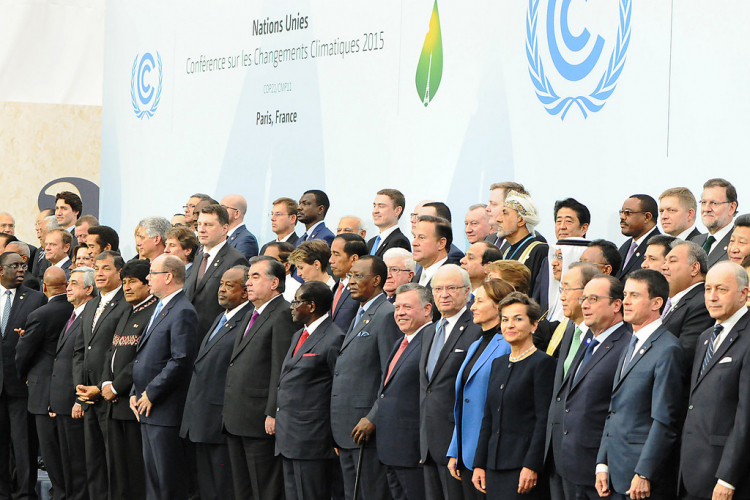Tackling Climate Change at AUP

Can a global climate conference actually solve climate change? Negotiable. In the wake of the failure of the fifteenth United Nations Climate Change Conference (COP15) that was held in Copenhagen in 2009, scientists were left unsure. However, despite past failures, the COP21 in 2015 initiated a new global climate agreement, The Paris Agreement. It was lauded as a major victory for policymakers and environmentalists.
Copenhagen Climate Conference, 2009. Image Credit: Craftivist Collective/FlickrNow, The American University of Paris (AUP) will be hosting a 3-day international conference. From March 29-31 the Joy and Edward Freiman Environmental Science Centre and the Citizens Climate Lobby will lead the event as an outcome of the Nobel Peace Prize Forum’s High Level-Climate Congress: “Solving the Climate Crisis in Time.”
“At these events, we can witness the first steps toward forming a global society.”
“It’s only when thousands of people with disparate backgrounds come together to discuss and work on new resolutions that a meaningful basis is formed for identifying shared problems and potential solutions,” reports Stefan Aykut, a political sociologist to Clisap, otherwise known as, Integrated Climate System Analysis and Prediction. “Climate conferences serve to network the relevant actors, and to reinforce the importance of climate change in our collective awareness. At these events, we can witness the first steps toward forming a global society.”
The first annual AUP climate conference, Translating Science into Climate Action, will bring together scientists and figures from the foremost international policy-driving institutions in the fields of economics, global policy, climate science, and biodiversity. In reference to the event, AUP stated, “It will aim to highlight the interdisciplinary nature of the global climate challenge, while at the same time challenging young leaders to make the critical connections necessary to take action to solve the climate crisis in time."
Melting Denali: Glacier recession due to greenhouse gas emissions is one of the most profound effects of climate change. Image Credit: National Park Service/Creative Commons
Panel discussions will be accompanied by a series of workshops, open to AUP students from any major, that focus on translating high-level science into national and global advocacy as well as the application of liberal arts perspectives to the development of creative, interdisciplinary solutions. The workshops will be geared toward the most pressing environmental challenges of our time, such as the release of anthropogenic greenhouse gas emissions. Participants will help design a road map toward not just a climate-smart, but a climate-just society.
“If we hope to mitigate climate change to a tolerable level, it’s civil society that has to now step up to the plate.”
This convention will build on outcomes of The Nobel Peace Prize Forums High-Level Climate Conference, which took place in Oslo, Norway during the week of the Nobel Peace Prize Award Ceremony in December 2018. It will address three themes:
Risk and Resilience
The impacts of climate change vary enormously in nature, gravity, location, time scale, and available migration/adaptation strategies. Questions dealing with the most pressing climate change related issues of our time will be addressed, along with how these risks will play out in regards to the human experience. The conference will also highlight the most urgent adaptation strategies required to deal with the planets rapidly changing environment.
Investing in Shared Responsibility
“While only a small number of wealthy nations are responsible for nearly all climate-driving greenhouse gas emissions, it is the least wealthy populations that are most vulnerable to climate impacts,” reports AUP. This theme will address global-wide economic reforms that are necessary to balance out the negative contributions from certain countries to the climate crisis. Potential policies that are positioned to motivate an elimination of practices that destabilize our environment and incentivize sustainable development will be discussed as well.
Climate Action in Paris. Image Credit: Jeanne Menjoulet/FlickrIntergenerational Equity
“The Paris Agreement acknowledges intergenerational equity as a universal right. Those with power today cannot act against the interests of those who will live with the impacts of their decisions in the future. Young leaders must play a role in advancing climate action, and ensuring the right of future generations to live without climate harm,” reports AUP. This theme will focus on how young leaders can concretely translate science into climate action, as well as how young leaders can advance intergenerational rights. Attendees will hear from international leaders working on advancing climate action through global organizations, business, finance, science, and policy advocacy.
While this conference is solution focused, with the fluctuation of successes and failures in various global climate conferences, who and what can actually solve climate change? Perhaps, educating the younger generation of global leaders at AUP will be the next greatest investment in saving the planet. As Aykut says, “If we hope to mitigate climate change to a tolerable level, it’s civil society that has to now step up to the plate.” The Climate Conference will be held at AUP's new Quai building, from March 29- 31.










